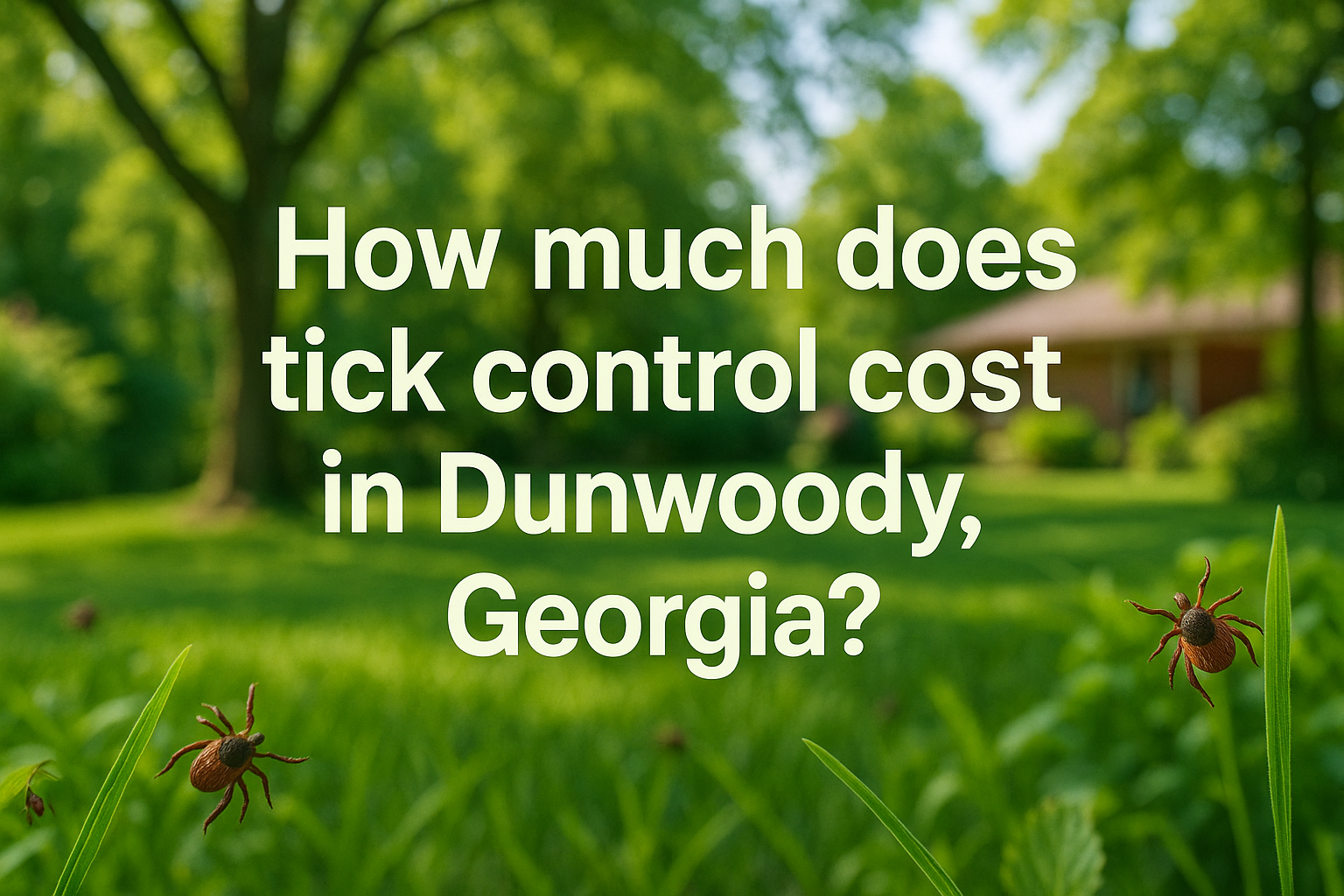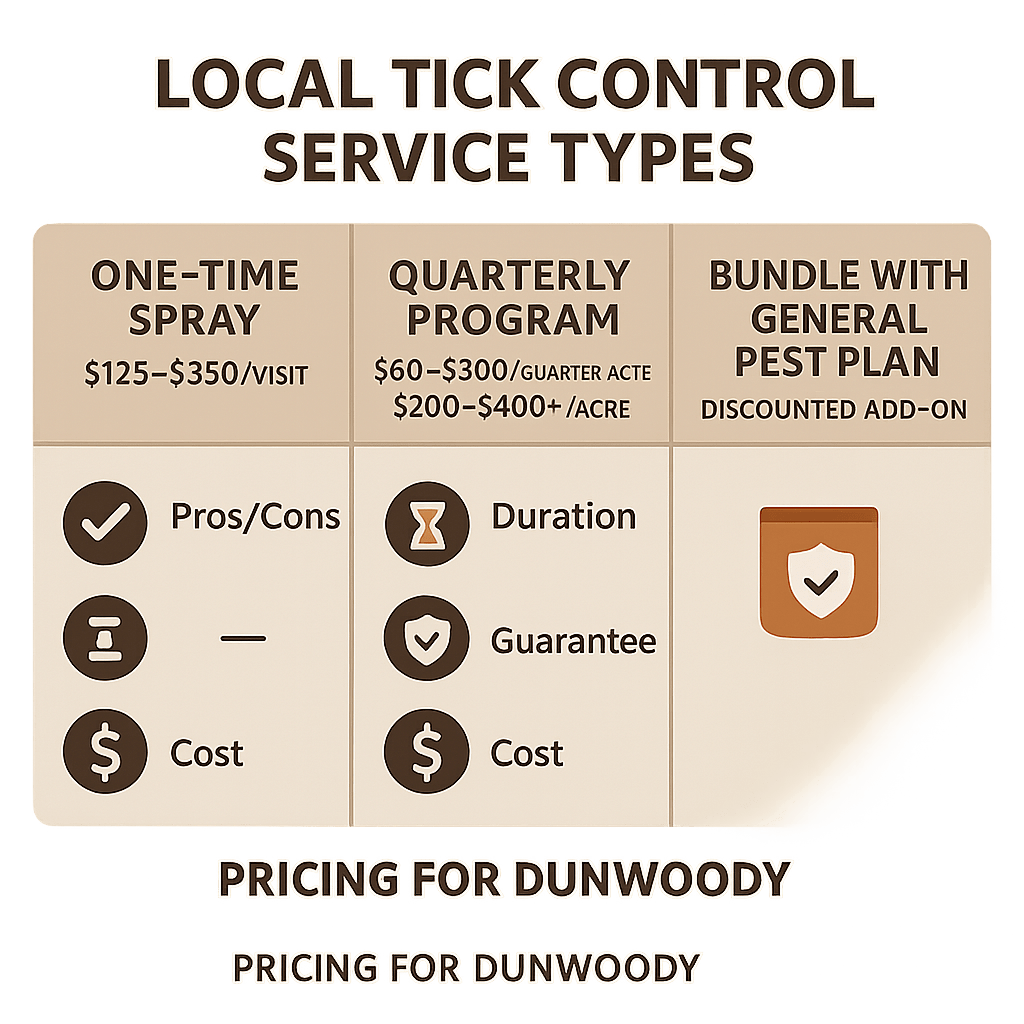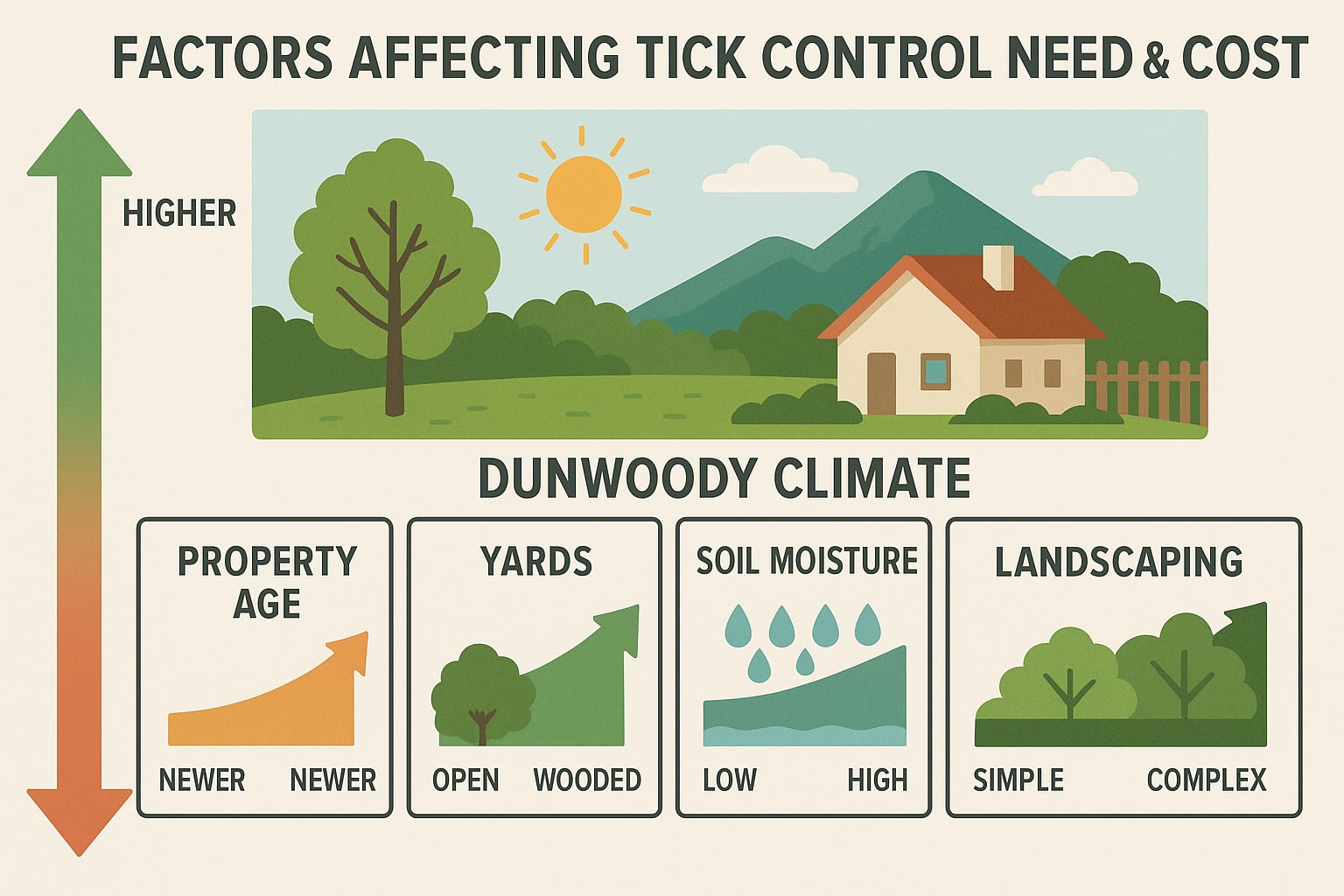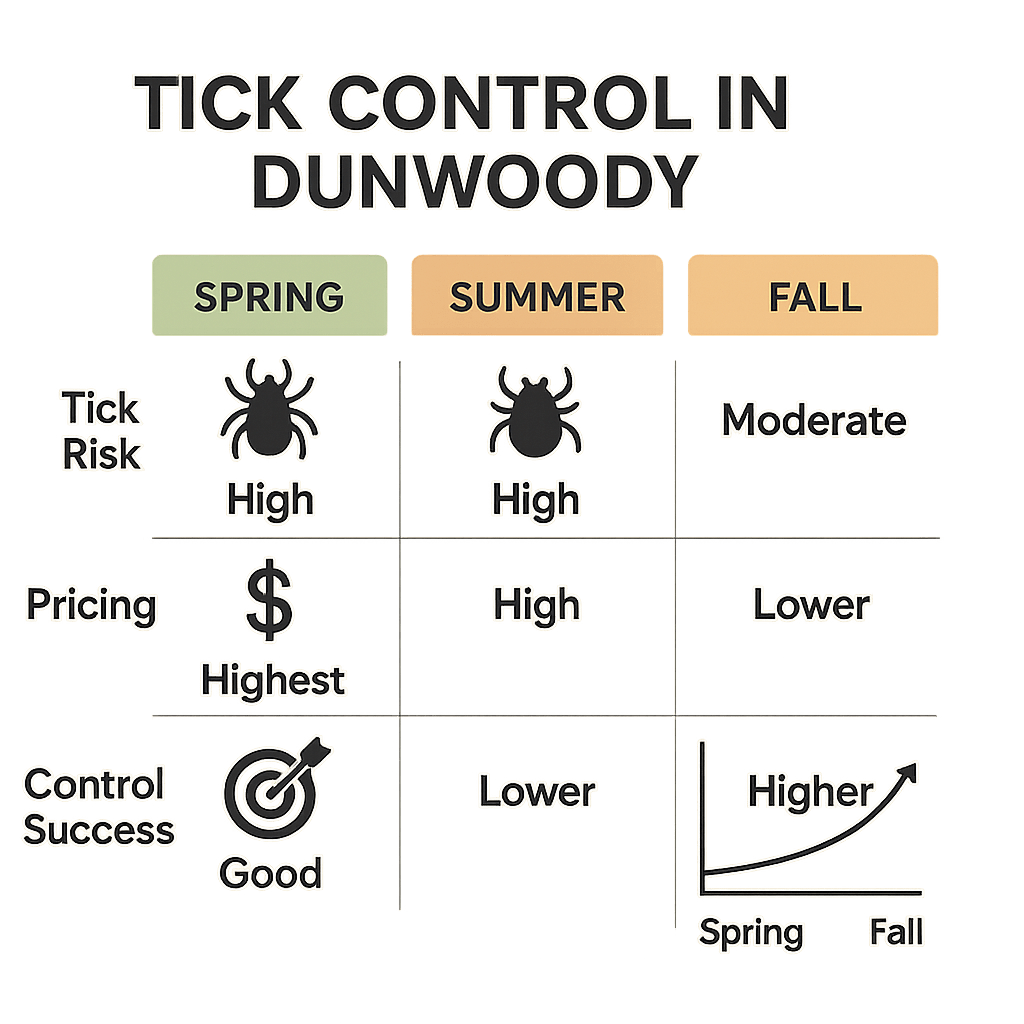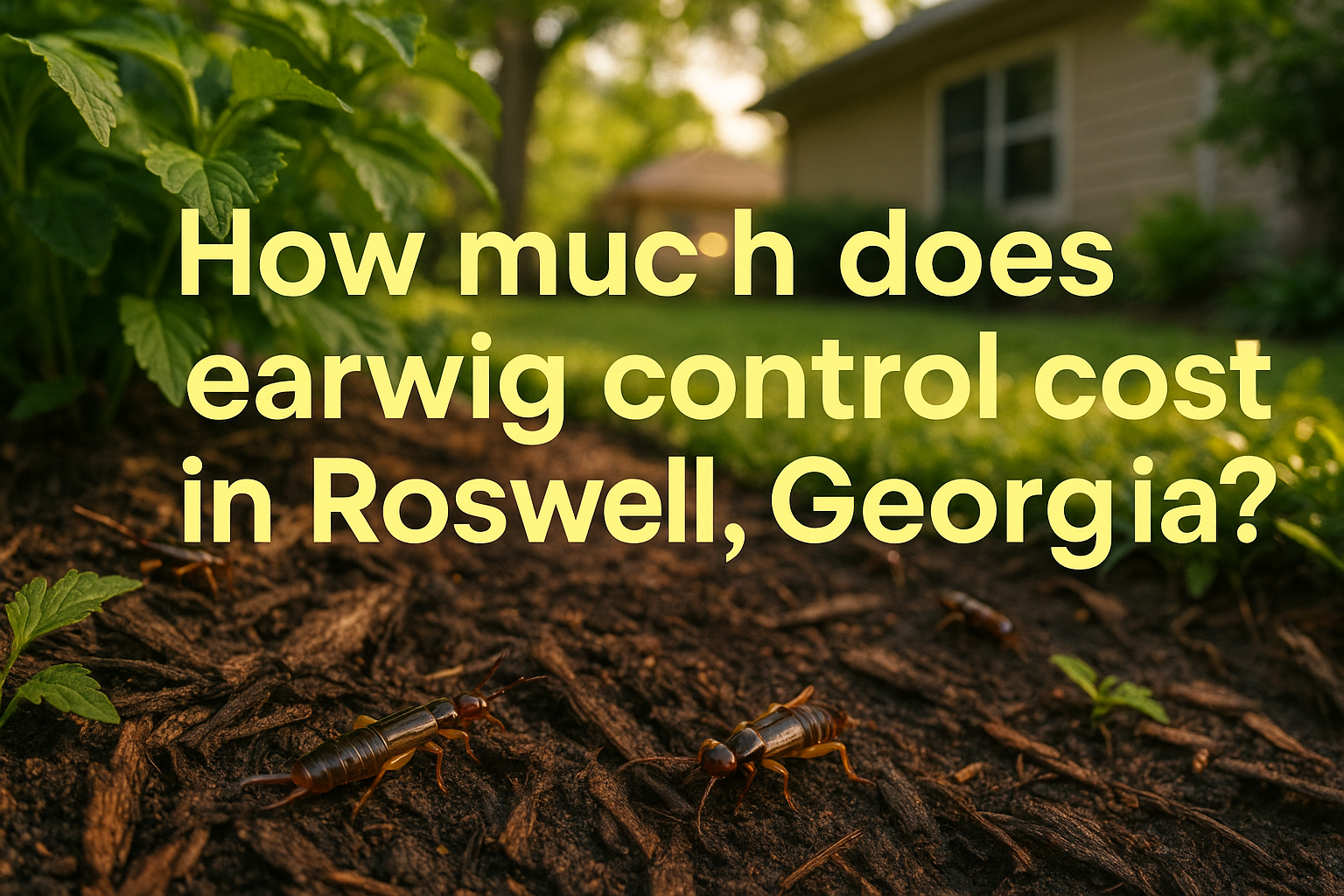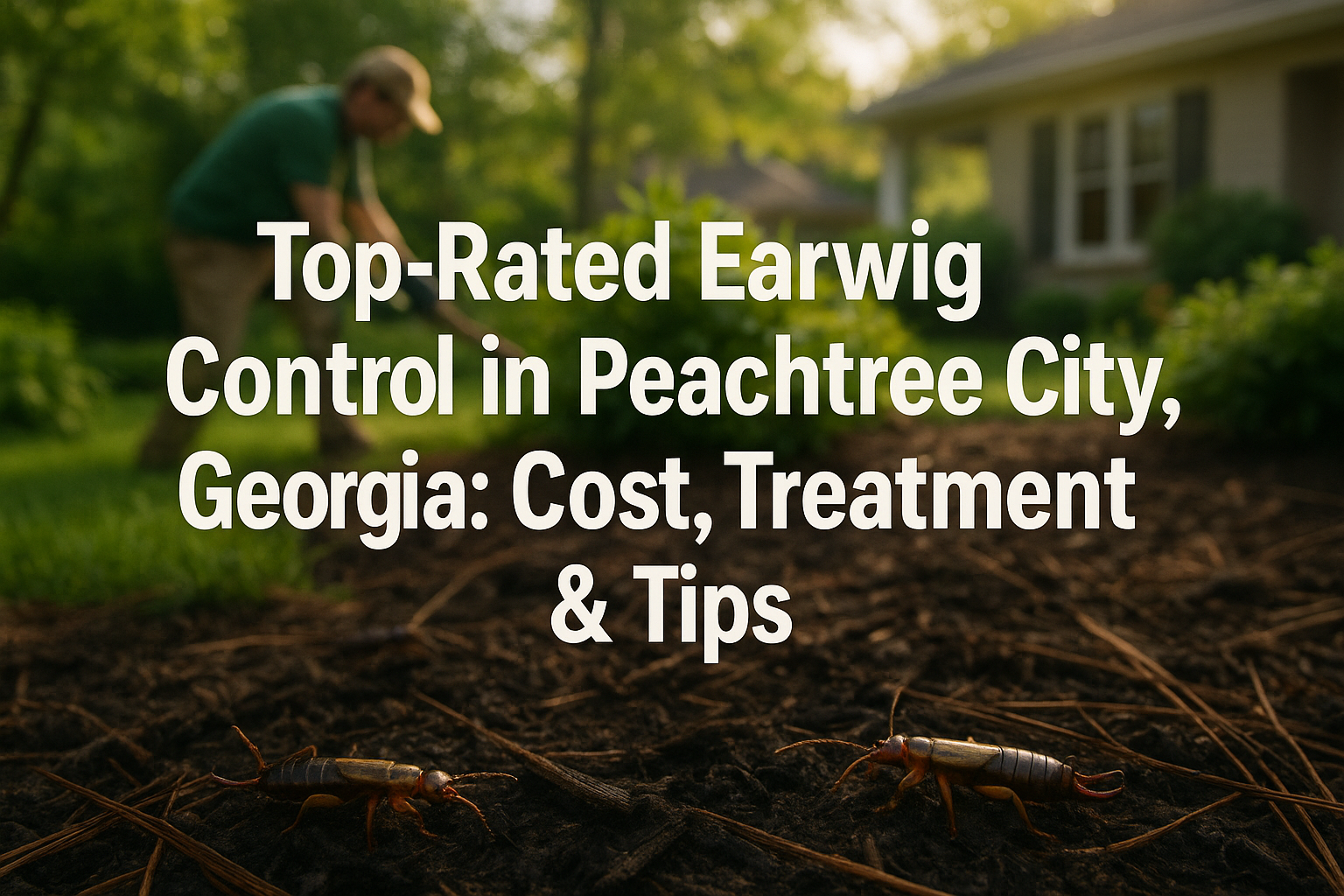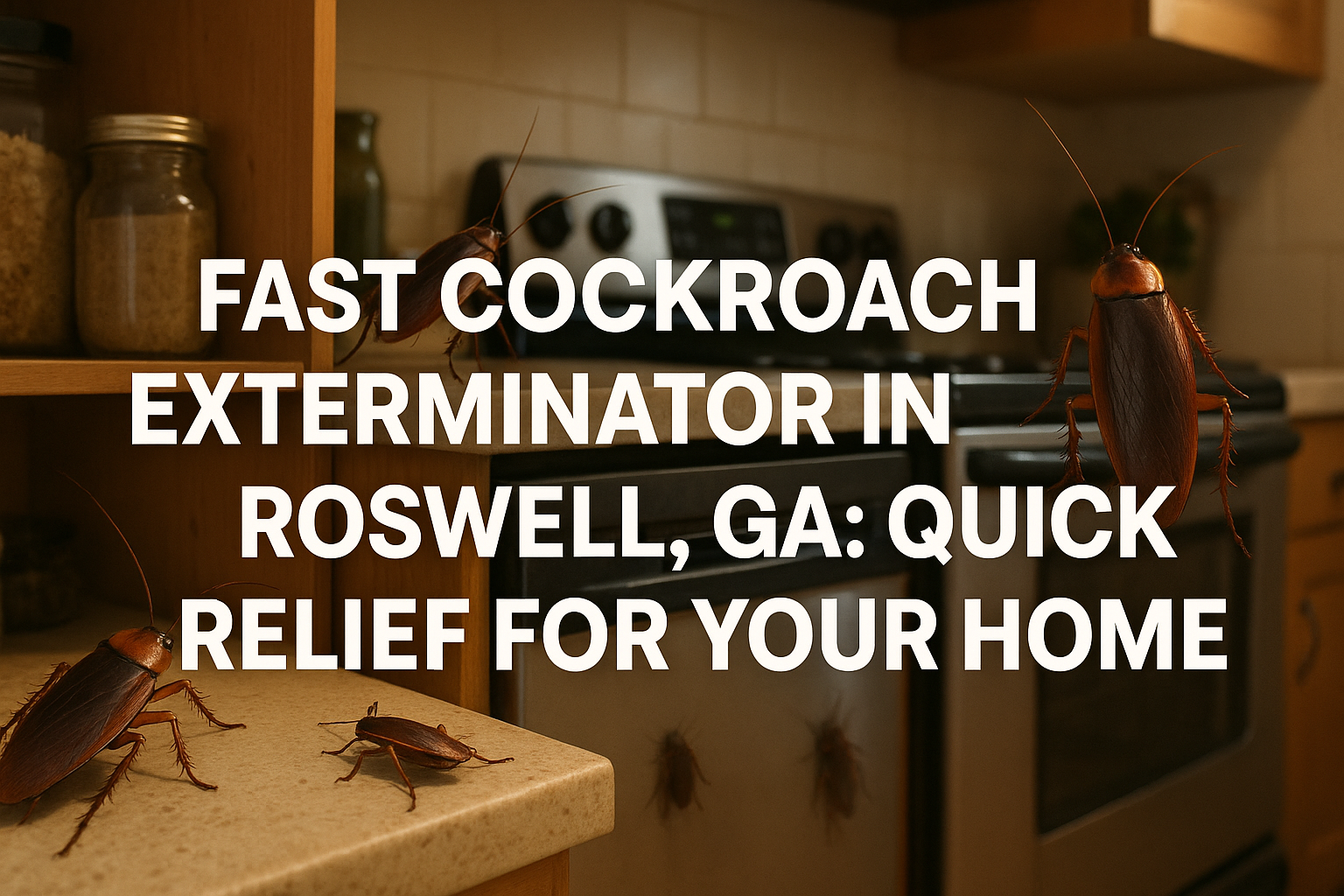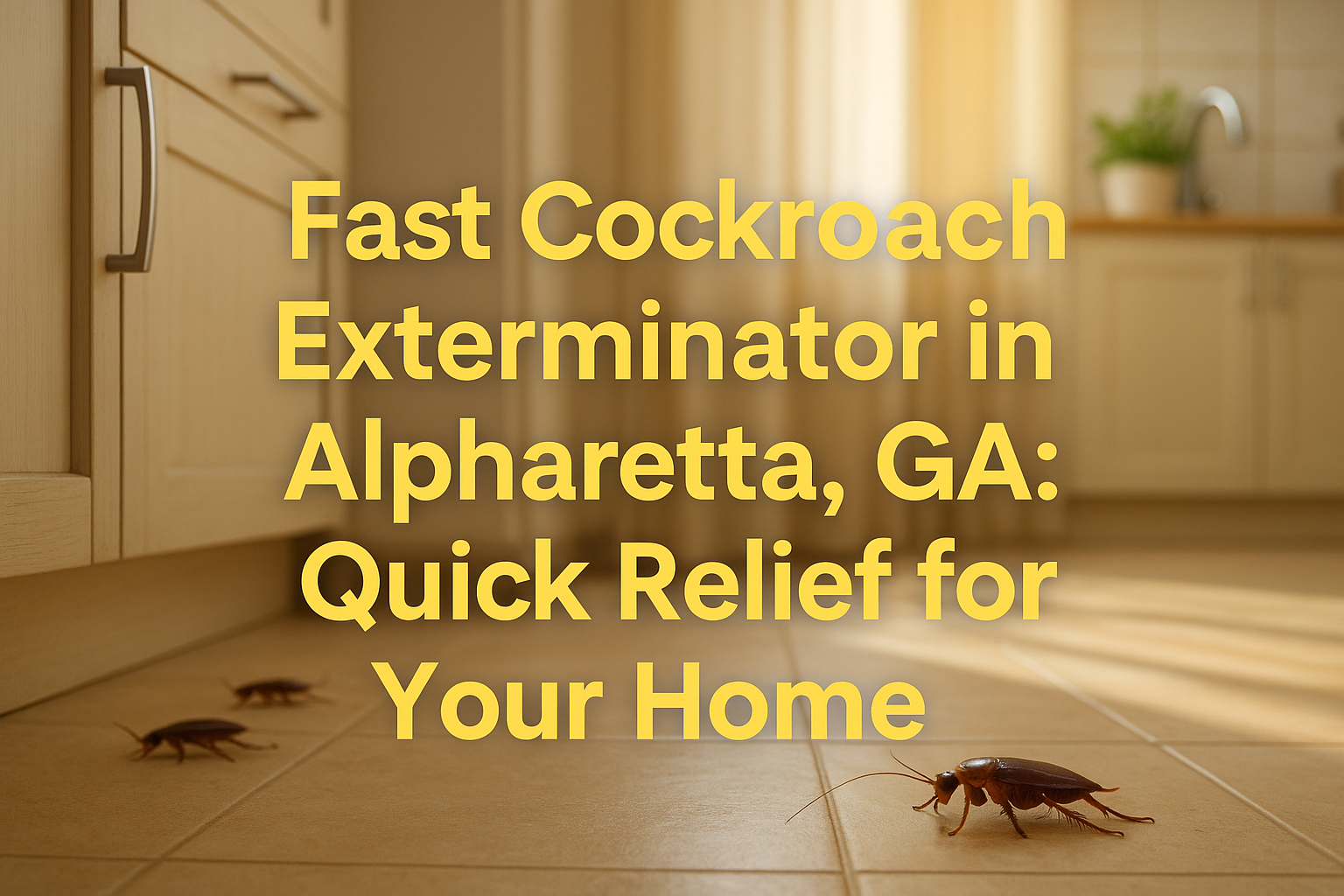Why Ticks Are a Big Deal in Dunwoody
If you’ve noticed more ticks around your yard lately—or caught your dog scratching at something that shouldn’t be there—you’re not alone. Dunwoody’s leafy streets and shaded parks are perfect for outdoor living, but they’re also a paradise for ticks. From backyards in Georgetown to the trails around Brook Run Park, these little pests thrive in the warmth and humidity of our Georgia summers. That’s why many homeowners now look for reliable tick control Dunwoody services to keep their families and pets safe. And the problem isn’t going away anytime soon.
Here’s the thing: ticks aren’t just a nuisance. Their bites can spread dangerous diseases like Lyme disease and Rocky Mountain spotted fever, putting families and pets at risk. That’s why paying attention to tick activity isn’t just about avoiding a few itchy bites—it’s about protecting the folks (and furry friends) you care about day in and day out.
So, how much does it cost to fight back? In Dunwoody, most homeowners pay somewhere between $125 and $350 per visit for professional tick treatments, depending on the size of your yard and whether you’re looking for a one-time fix or regular service. For medium-sized yards (about a quarter-acre), you’re typically looking at $60–$300 per treatment. If you’ve got a whole acre of land, expect costs to run $200–$400 or more per visit. These numbers line up with what Anthem Pest Control charges locally and are right on par with the national averages, so you won’t find surprises on your bill.
With so many options out there—everything from single-visit sprays to year-round protection plans—it can feel overwhelming to pick what’s right for your home. But knowing the costs up front and how these services stack up can save you money and headaches in the long run. Up next, we’ll get into what to look for in a tick control service, how the different treatment options compare, and some smart ways to keep your property tick-free all season without breaking the bank.
What Affects the Cost of Tick Control in Dunwoody?
If you’re thinking about tackling ticks in Dunwoody, let’s be honest—there isn’t a one-size-fits-all price tag. The bill you get for tick control Dunwoody services depends on a handful of real-world factors that make a big difference in what you pay and what you get.
- Size of Your Yard: It’s no surprise—the bigger the property, the higher the cost. A quarter-acre suburban lawn is a different beast compared to a sprawling, wooded acre or odd-shaped lot. The more ground to cover, the more product (and muscle) it takes to keep ticks in check.
- How Bad the Infestation Is: An early catch costs less. But if you’re dealing with a full-on outbreak—think ticks showing up in your home or biting the dog—expect extra treatments and some indoor attention, which ups the price.
- The Type of Service You Pick: Sprays are common, but they’re not your only option. Some folks want eco-friendly or integrated pest management plans. These choices may come with a higher per-treatment cost, but sometimes they save you money (and headaches) in the long run.
- Your Neighborhood’s Unique Challenges: If you’re living near heavy brush, woods, or community parks—places like Huntley Hills or Mill Glen—you’re in tick country. Denser ground cover or yards that butt up against wild areas usually need more frequent and intensive service, which piles onto the price.
- How Providers Price It: Many pros charge per square foot, anywhere from $0.08 up to $0.15. This method helps nail down a fair estimate, especially if your yard’s not the typical rectangle or you’ve got a lot of landscaping features.
- Frequency of Treatments: Going with a seasonal or quarterly plan might mean bigger upfront or recurring bills, but your per-visit cost tends to drop, and you’ll see steadier results—not just quick fixes.
So, what should you budget? For most Dunwoody homes, expect to pay somewhere between $60 and $300 per quarter-acre, about $200 and up per acre, or $125 to $350 per average yard per treatment. Got a bad infestation? Costs can hit $1,000 or more if the job needs major follow-ups and a full reset.
Whatever you do, ask for a walk-through and a detailed estimate. A solid pro won’t just throw numbers at you—they’ll take the time to check your specific situation and neighborhood challenges. That’s the real key to getting the right results at a fair price.
What Affects the Cost of Tick Control in Dunwoody?
If you’re thinking about tackling ticks in Dunwoody, let’s be honest—there isn’t a one-size-fits-all price tag. The bill you get for tick control Dunwoody treatments depends on a handful of real-world factors that make a big difference in what you pay and what you get.
- Size of Your Yard: It’s no surprise—the bigger the property, the higher the cost. A quarter-acre suburban lawn is a different beast compared to a sprawling, wooded acre or odd-shaped lot. The more ground to cover, the more product (and muscle) it takes to keep ticks in check.
- How Bad the Infestation Is: An early catch costs less. But if you’re dealing with a full-on outbreak—think ticks showing up in your home or biting the dog—expect extra treatments and some indoor attention, which ups the price.
- The Type of Service You Pick: Sprays are common, but they’re not your only option. Some folks want eco-friendly or integrated pest management plans. These choices may come with a higher per-treatment cost, but sometimes they save you money (and headaches) in the long run.
- Your Neighborhood’s Unique Challenges: If you’re living near heavy brush, woods, or community parks—places like Huntley Hills or Mill Glen—you’re in tick country. Denser ground cover or yards that butt up against wild areas usually need more frequent and intensive service, which piles onto the price.
- How Providers Price It: Many pros charge per square foot, anywhere from $0.08 up to $0.15. This method helps nail down a fair estimate, especially if your yard’s not the typical rectangle or you’ve got a lot of landscaping features.
- Frequency of Treatments: Going with a seasonal or quarterly plan might mean bigger upfront or recurring bills, but your per-visit cost tends to drop, and you’ll see steadier results—not just quick fixes.
So, what should you budget? For most Dunwoody homes, expect to pay somewhere between $60 and $300 per quarter-acre, about $200 and up per acre, or $125 to $350 per average yard per treatment. Got a bad infestation? Costs can hit $1,000 or more if the job needs major follow-ups and a full reset.
Whatever you do, ask for a walk-through and a detailed estimate. A solid pro won’t just throw numbers at you—they’ll take the time to check your specific situation and neighborhood challenges. That’s the real key to getting the right results at a fair price.
How Dunwoody’s Local Environment Impacts Tick Control
If you’ve lived in Dunwoody for a while, you know our mix of muggy summers and gentle winters means ticks aren’t just a seasonal nuisance—they’re a near-constant concern. Whether you’re out tending to your garden or the kids are playing in the backyard, ticks take full advantage of our long growing season. The lush, mature landscaping you see in neighborhoods like North Springs and Redfield? That’s a tick’s dream home: overgrown bushes, shady nooks, and lots of leaf litter create hiding spots most folks overlook.
Older homes, or houses with intricate landscaping, have their own quirks when it comes to tick control. Dense underbrush, winding paths, and thick mulch beds often need special care. Sometimes, these features mean your technician needs to use targeted spray techniques or even come out for a second visit if the first round of treatment can’t reach every corner. That extra labor and expertise often shows up in your final price.
Then there’s the lay of the land. Steep-sloped yards, pockets of dense shade, poor soil drainage—or properties tucked up near stretches of mature woods like the Perimeter Greenway—can mean more than just stubborn spots for ticks to nest. They cause moisture to stick around after every afternoon thunderstorm, helping ticks stick around longer too. These tricky areas might call for specialty products or adjusted application schedules, and yes, that sometimes means a bump in costs.
We’d be remiss if we didn’t mention the local critters. Chipmunks, deer, even your neighbor’s outdoor cat—they all play a role in spreading ticks across properties. Add in the fact that pest populations can develop resistance to common treatments over time, and suddenly the value of having a professional who knows Dunwoody’s patterns and pitfalls becomes crystal clear.
Long story short: you’re not just paying for “any old” tick treatment. You’re investing in a custom approach, tuned to the local environment that surrounds your home. Up next, we’ll lay out how these factors stack up and what they mean for your options—and your wallet.
Easy Ways to Keep Ticks Away—And Save Cash in the Process
If you want to avoid paying for big tick control services all the time, a few regular habits in your yard can make a huge difference. Think of it as your personal defense plan against a tiny, nasty headache—plus a way to protect your wallet down the road.
- Keep your grass short. Ticks love tall, overgrown grass. Mow regularly and you’ll give them less cover to hang around.
- Clean up leaves and brush. Leaf piles, old mulch, and forgotten branches are tick magnets. Get rid of them as you see them so those pests don’t have a place to hide.
- Trim back shrubs and bushes. Especially the ones near yards and play areas. The more open space you create, the less attractive it is for ticks.
- Add a buffer zone. If your property backs up to woods, lay down gravel or a thick mulch line to keep ticks from crawling over into your yard. It’s a simple trick that professionals recommend all the time.
- Keep patios and play spaces tidy. Move toys, furniture, and yard clutter out of grass and wooded borders; ticks love hiding places.
Staying one step ahead of the problem is key. Too many folks only think about control after they see ticks—by then, you’re paying more to fix a big problem instead of avoiding it. Booking regular seasonal checkups can save you cash in the long run by stopping infestations before they get out of hand.
If you have pets, be extra cautious. Stick with vet-recommended tick prevention and limit your dog’s roaming in deep brush or wooded corners. Just doing this can slash tick traffic into your home.
And don’t forget: Many companies—including Anthem Pest Control—offer free estimates or discounts on bundled prevention services. Locking in a plan now isn’t just about peace of mind; it’s usually a lot cheaper than reacting later.
Next up: We’ll have a side-by-side look at what happens when you take action early versus playing catch-up, and how that impacts both pest control and your budget.
When to Get Serious About Tick Control in Dunwoody
If you live in Dunwoody, you know how fast our mild winters turn into humid springs—and how that signals the start of tick season. Ticks don’t wait around, and neither should you. As the weather warms up in March and April, tick eggs begin to hatch, and hungry nymphs are out looking for their first meals. This is prime time to get an edge on infestations, not just react when you notice the first bite or see a tick on your pet.
Here’s the inside scoop: most residents book their tick control Dunwoody treatments early spring, usually in March or April. Doing this means your yard is protected right before tick populations explode with the onset of warmer days. Professional tick control works best when it’s proactive, not just a quick fix. Anthem Pest Control and other local pros recommend getting on the schedule before peak season—because once these critters start multiplying, it’s much harder to get them under control.
- Early Spring (March–April): The best time to kick off treatment. You’ll target ticks before they have a chance to invade in big numbers.
- Follow-up Treatments (Late Spring–Summer): Staying consistent matters. Booking follow-ups every 4–6 weeks keeps your yard a no-go zone for ticks when they’re most active.
- Early Fall (September–November): A final round helps wipe out late-season ticks and keeps your home protected as cooler weather settles in.
There’s more to timing than just avoiding bugs—off-peak months (early spring and late fall) often come with lighter demand and better pricing from most pest control companies. That means you may save money if you plan ahead, instead of calling in the panic of mid-summer.
Above all, focus on prevention. Skipping preventive care means a single treatment might not keep up when local tick populations boom, risking bites and the spread of tick-borne illnesses. If you’re considering the best window for services in your Dunwoody neighborhood, trust your calendar (and your local experts): start early, stay consistent, and lock in treatments for peace of mind all year long.
Take Back Your Yard—Tick-Free Starts Today
If you’re tired of worrying every time your pets or kids play outside, let’s change that. Anthem Pest Control is your local, Dunwoody-based team that’s got your back. We know what works against ticks around here, and we make sure you won’t have to stress about bites or diseases. It’s as easy as picking up the phone.
- Call 877-371-85196—no strings attached, just a free, expert checkup of your property.
- Find out exactly what works for your yard, with honest answers and a price that won’t make you blink.
- Our local techs know Dunwoody, so you get a solution that fits your home—not some generic spray-and-dash service.
- We back what we do with a satisfaction guarantee.
Looking for more details first? Check out our tick control solutions in Sandy Springs—they work great right here, too!
Don’t wait for tick season to get worse. Protect your family and pets the easy way. Give Anthem Pest Control a call today and see how simple safe living can be.
Tick Control FAQs for Dunwoody Homeowners
Curious about how tick control works around your home in Dunwoody? Here are some answers to the most common questions folks ask once service is on their mind—or already scheduled.
- How soon can the kids and pets head back out after a tick treatment?
Once your yard is treated, just give it an hour or two—or until things dry. After that, it’s safe for everyone to enjoy again. If your pest tech gives you a more specific timeline, always stick to their advice. - Is professional tick service tough on pets or lawns?
No worries here. Licensed techs use EPA-registered products and follow all the safety rules, so your furry friends and your landscaping stay protected. You can rest easy about your kids’ bare feet in the grass, too. - What if I still see ticks after treatment?
You’re covered. Companies like Anthem Pest Control stand behind their work with satisfaction guarantees. If those ticks aren’t gone, you get a no-cost retreatment—simple as that. - How often should I schedule tick control here in Dunwoody?
Ideally, you want to book tick control Dunwoody service every 4–6 weeks during the spring, summer, and early fall. That’s when the tick pressure really ramps up in our area and ongoing treatments keep populations down.
- Can I add tick treatment to my regular pest plan?
Absolutely! Most pest companies offer bundle deals, letting you add tick protection to your usual pest lineup. It’s a smart way to save and tackle multiple pests at once. - Will a single visit wipe out all ticks?
One treatment makes a difference, but heavy tick problems often take a few rounds to get fully under control. Long-term, regular treatments are the name of the game for lasting peace of mind in your yard. - Can I get a free estimate?
Definitely. Anthem Pest Control is just a call away at 877-371-85196. They’ll walk your property (virtually or in person) and craft a plan that fits your home and budget—no charge, no pressure. - Are some neighborhoods in Dunwoody worse for ticks?
Yes, some spots see more tick action than others. If you live near Brook Run Park, Georgetown, North Springs, or any of Dunwoody’s lush, wooded neighborhoods, you’ll want to keep an extra eye out each season.
Still scratching your head about tick control? No shame in that. Your local pest pros are always happy to talk through any unique concerns for your family or pets—and get your backyard back to the tick-free zone everyone loves.

